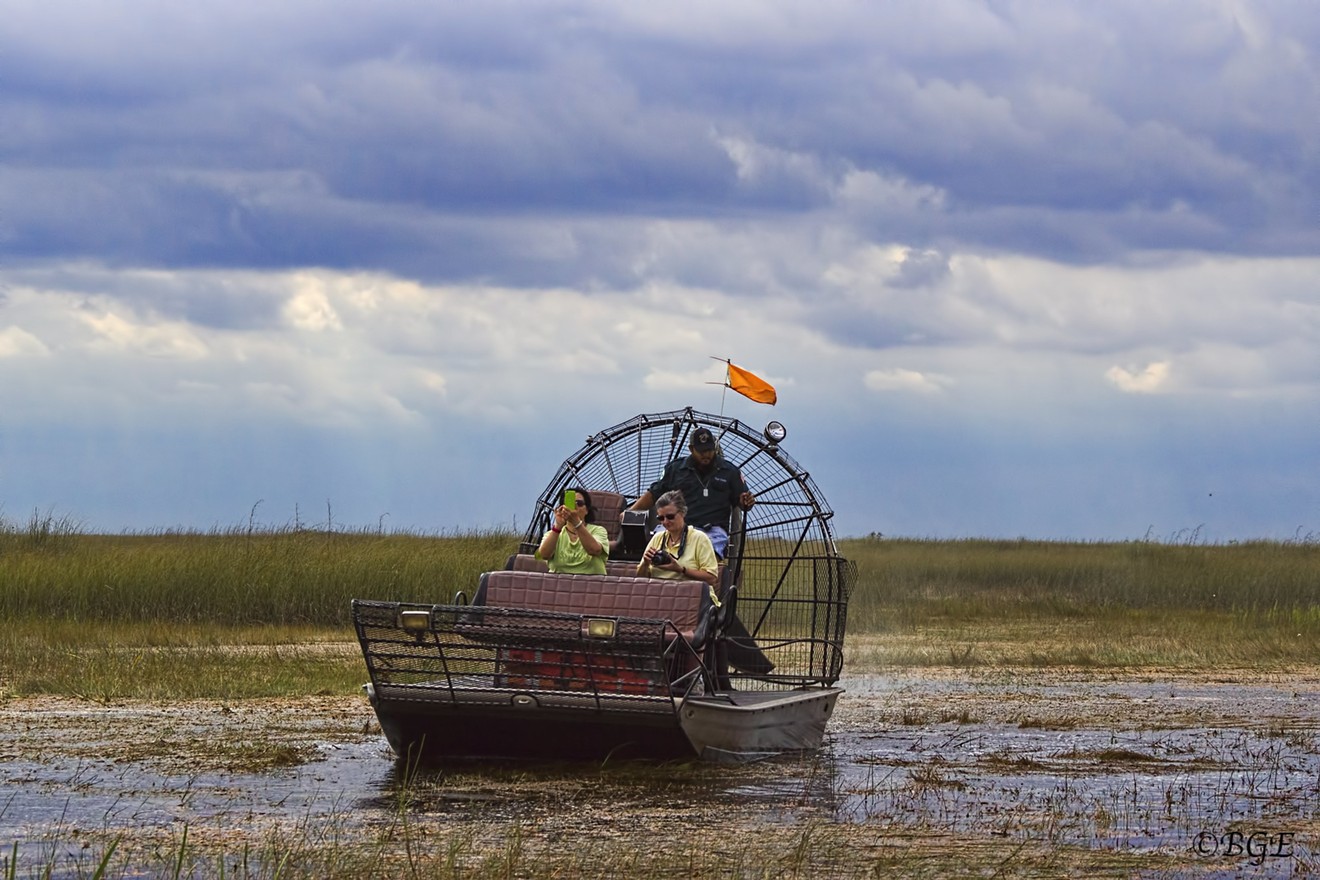Two years ago, an Israeli theater student, Elizabeth "Ellie" Goldenberg, went on an airboat ride only one day after graduating from the University of Miami. The trip began innocently enough, but five minutes into the ride, the boat tipped over while trying to navigate around a disabled vessel. In an instant, the passengers were thrown from the airboat and Goldenberg was crushed beneath the engine cage. A toxicology report later showed the airboat operator had high levels of THC in his system.
Goldenberg's death shocked state legislators into action: Within a year, new safety requirements were signed into law by then-Gov. Rick Scott. Under "Ellie's Law," commercial airboat operators are now required to complete courses in CPR and first aid as well as a safety training course approved by the Florida Fish and Wildlife Conservation Commission (FWC).
The new safety rules officially went into effect at the beginning of this month. Yet no one, including state officials, can say with certainty how many companies are in compliance. The FWC is tasked with enforcing the new law but isn't actually required to keep a list of who is or isn't following the rules.
"We do not track industry-wide compliance," says Carol Lyn Parrish, a spokeswoman for FWC. "Any operator in a commercial capacity must show proof of completion of the training when requested by law enforcement."
In other words, an airboat company doesn't have to submit any proof of course completion by its operators to FWC unless the commission's enforcement division formally requests it.
There were more than 75 airboat accidents in Florida between 2014 and 2017, according to a 2017 New Times investigation. More than 100 airboat passengers involved in those accidents were seriously injured, suffering ruptured spleens, cracked skulls, and dismemberment. Seven passengers, including Goldenberg, died in that three-year period.
Though many aspects of the industry remain unregulated — there's no minimum age to operate an airboat, and passengers still aren't required to wear seat belts or life vests — Ellie's Law marked the first serious attempt to reel in a largely unregulated industry in which operators could lead airboat tours without holding a license or completing any standardized training.
Yet some of those who provide the new safety courses seriously doubt most airboat operators have fulfilled the updated requirements.
"There's no way everyone is in compliance. There's just no way," says Bob Knight, the director of Tactical Advantage Consultants. Knight's company was one of the first three approved by the state to provide safety training courses. "There were only three course providers available for the entire state for the longest time. You can't tell me those three handled most of the operators in Florida. Even with the new course providers, I don't know how they could do it in that time."
Another course provider, USA Marine Training, has trained several companies, averaging ten to 15 operators per company. Director Randy Hill says he's seen an "overwhelming response" from airboat companies looking to do the right thing and obtain the necessary certifications, although he says there are still bad actors the state needs to target with enforcement.
"The sad part is if [the noncompliant airboat operators] don't take the safety rules seriously, our kids and our grandkids aren't going to be able to drive airboats anymore," Hill says.
As of 2017, more than 1,000 commercial airboats were registered in Florida. FWC-approved course providers keep lists of every airboat company and operator they train, which could be used by state officials to pin down noncompliant companies. Knight says he's gone as far as to offer his list to state officials to help with enforcement, only to be turned away.
"I called up Tallahassee and asked, 'Do you want the names?' They said, 'Don't worry about it. You keep it. Hold on to it in case of an audit,'" Knight says.
Knight's experience is consistent with FWC's stated policy of not tracking compliance. But for Hill, things were notably different. Hill says various FWC supervisors reached out to him to request a list of operators he'd helped train, to which he complied.
FWC did not respond to New Times' requests for more information about any list requests by its officers. Nor did it provide information about any companies that have been punished since the law took effect. Violating Ellie's Law is now a misdemeanor offense punishable by up to a $500 fine.
The lack of a database makes catching bad actors in the commercial airboat business much more difficult. It's also created plenty of "swamp drama," as one course provider put it, in which airboat operators try to snitch on one another on the suspicion of noncompliance. Moreover, the lack of transparency perpetuates long-existing safety concerns in the industry. A common complaint prior to Ellie's Law was that airboat operators who violated the few safety requirements were punished only after they'd caused an accident. That dynamic, it appears, won't change anytime soon.
"I'm glad FWC came up with these rules. It's a good thing. It's going to make airboating safer," Knight says. "But it could be better. I'd like there to be more transparency on compliance and enforcement."
[
{
"name": "Air - MediumRectangle - Inline Content - Mobile Display Size",
"component": "19274298",
"insertPoint": "2",
"requiredCountToDisplay": "2"
},{
"name": "Editor Picks",
"component": "17482312",
"insertPoint": "4",
"requiredCountToDisplay": "1"
},{
"name": "Inline Links",
"component": "18711090",
"insertPoint": "8th",
"startingPoint": 8,
"requiredCountToDisplay": "7",
"maxInsertions": 25
},{
"name": "Air - MediumRectangle - Combo - Inline Content",
"component": "17482310",
"insertPoint": "8th",
"startingPoint": 8,
"requiredCountToDisplay": "7",
"maxInsertions": 25
},{
"name": "Inline Links",
"component": "18711090",
"insertPoint": "8th",
"startingPoint": 12,
"requiredCountToDisplay": "11",
"maxInsertions": 25
},{
"name": "Air - Leaderboard Tower - Combo - Inline Content",
"component": "17482313",
"insertPoint": "8th",
"startingPoint": 12,
"requiredCountToDisplay": "11",
"maxInsertions": 25
}
]












